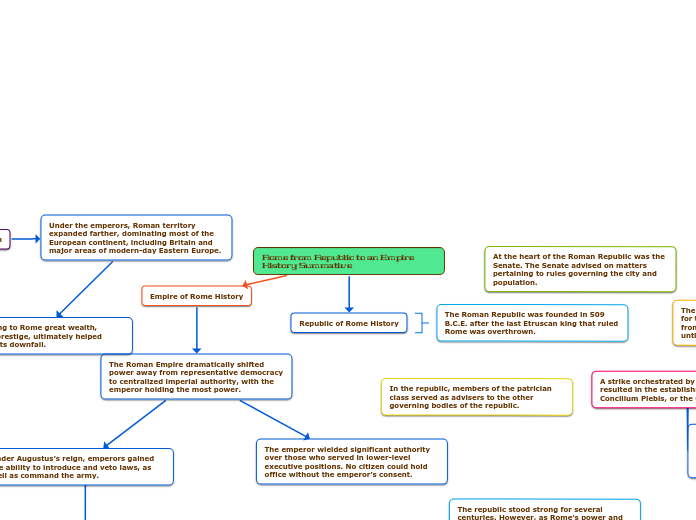Augutus's Reign
Under the emperors, Roman territory expanded farther, dominating most of the European continent, including Britain and major areas of modern-day Eastern Europe.
While bringing to Rome great wealth, power, and prestige, ultimately helped bring about its downfall.
the Roman Empire had solidified control over the Italian peninsula, established North African colonies following its victory over Carthage during the Punic Wars and controlled large swaths of territory in Spain and Gaul.
A strike orchestrated by the plebeians resulted in the establishment of the Concilium Plebis, or the Councilof the Plebs.
The Senate, fearful of Caesar’s power, demanded he give up command of his army and return to Rome as a citizen. Caesar refused, instead marching his army south directly into Rome
In the republic, members of the patrician class served as advisers to the other governing bodies of the republic.
At the heart of the Roman Republic was the Senate. The Senate advised on matters pertaining to rules governing the city and population.
The republic stood strong for several centuries. However, as Rome’s power and territory expanded, internal conflicts began to emerge as citizens and families struggled for power.
As a result, another civil war erupted between Caesar and his chief political rival, Pompey. Caesar emerged victorious and was named dictator for life.
In response to Caesar’s death, his nephew and heir Augustus defeated the conspirators. He then established himself as the first Roman emperor.
The Senate lasted as a sole governing body for the republic for only a brief time, lasting from the republic’s founding in 509 B.C.E. until 494 B.C.E.
Other leaders within the republic feared Caesar would become a tyrant with this new title. To prevent this, a group of senators conspired and assassinated him
During these civil wars, a prominent general and statesmen named Julius Caesar began gaining significant power. He commanded the loyalty of the soldiers in his army and enjoyed access to substantial wealth after conquering the province of Gaul.
Ultimately, factions emerged (loyal to either the patrician or plebeian classes or to a specific military general), hostilities erupted, and a series of civil wars plagued the republic.
The Roman Republic was founded in 509 B.C.E. after the last Etruscan king that ruled Rome was overthrown.
Rome from Republic to an Empire History Summative
Empire of Rome History
The Roman Empire dramatically shifted power away from representative democracy to centralized imperial authority, with the emperor holding the most power.
The emperor wielded significant authority over those who served in lower-level executive positions. No citizen could hold office without the emperor’s consent.
Under Augustus’s reign, emperors gained the ability to introduce and veto laws, as well as command the army.
Primarily, the Senate survived during the early period of the empire as a legitimizer of an emperor’s rule. The powers given to the emperor still came from the Senate.
The Senate could declare an emperor to be an enemy of the state, or following an emperor’s removal or death, the Senate could officially wipe the record of his reign from official history.
Republic of Rome History

